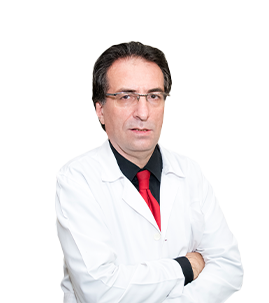NEPHROLOGY

Nephrology is a medical science that deals with kidney diseases. It is a sub-branch of internal medicine. Nephrology clinics treat diseases such as acute renal failure, chronic renal failure, cystic kidney diseases, nephritis (kidney inflammation) hypertension, electrolyte disorders, blood in urine and protein loss in urine. Our nephrology clinics provide haemodialysis services for chronic dialysis patients or patients requiring urgent dialysis. Patients requiring organ transplantation are directed to the relevant centres after all kinds of preparations are made.
Diseases that the nephrology department deals with:
The main field of study of the nephrologist is to evaluate the sudden or slow loss of renal function, to undertake diagnosis and treatment; to regulate blood pressure in patients with hypertension; to correct water and electrolyte (such as sodium, potassium, calcium, phosphorus) disorders and to investigate the causes of urinary abnormal findings, especially protein leakage and bleeding in the urine; To evaluate and treat the adverse effects of systemic diseases such as diabetes, blood pressure, heart failure, rheumatological diseases and drugs on the kidney, to plan kidney transplantation and dialysis in patients with advanced renal failure and to follow up the patients.
Functions of the Kidney:
The most basic task of the kidneys is to clean the waste substances in the body to maintain health, to regulate the water, electrolyte and acid balance in the body, to regulate blood pressure, to provide blood-forming hormone and vitamin D synthesis. A healthy kidney is expected to clean the blood from harmful wastes (such as urea, creatinine) and add them back to the system. If the kidneys cannot perform these essential tasks for any reason, kidney failure or kidney failure problems are encountered.
Acute Kidney Failure: It is called sudden and rapid loss of kidney function. Problems such as fluid loss, germs in the blood, drugs used, sudden muscle destruction, affecting the vascular system of the kidney or kidney stones that affect urine output can cause acute renal failure. In this case, the aim is to reveal the causes that damage the kidney, to initiate supportive treatment before damage occurs, and to relieve the patient metabolically by making a temporary dialysis treatment plan if kidney function is significantly affected.
Chronic Renal Failure: More than 3 months of kidney damage findings and loss of kidney function indicate chronic renal failure. The most common causes are diabetes, hypertension, renal vascular diseases, nephritis, genetic inherited kidney diseases such as polycystic kidney or congenital kidney diseases such as horseshoe shaped kidneys, Familial Mediterranean Fever. In the treatment of chronic renal failure, the priority is to treat the causative disease. In addition, supportive treatment is given to correct metabolic disorders. The goal is to correct or stop the loss of kidney function. The control of blood pressure and diabetes is of great importance in stopping kidney damage. When there is a severe loss of kidney function, uremic symptoms occur, fluid-electrolyte imbalance, acid unit and anaemia develop. In this case, kidney transplantation or dialysis (haemodialysis/peritoneal dialysis) options should be considered.
Haemodialysis Procedure
In renal failure patients whose kidneys do not function adequately, water, electrolytes and some wastes in the blood accumulate in the blood because they cannot be removed from the body. In these patients, the function of the kidneys is fulfilled by haemodialysis. With this process, blood is taken and passed through the dialyser with a semi-permeable membrane between the dialysis fluid in the haemodialysis device. Meanwhile, harmful substances that need to be removed from the blood pass into the dialysis fluid, which has a lower density than the blood, and the cleaned blood is reintroduced to the body. This procedure is performed using a fistula placed between the artery and vein in the arm. The fistula is placed in the arm with the help of an operation and a period of 3-4 weeks must have passed since the operation in order for dialysis to be performed using the fistula. In patients who cannot wait for this period and need to receive haemodialysis urgently, dialysis is performed temporarily with the help of catheters to be opened from veins in areas such as the neck and groin.
Nephritis
'Nephritis', which is defined as glomerulonephritis, affects the filtration of the kidney and is characterised by inflammatory cell migration into the kidney tissue, consists of many sub-disease groups. Symptoms can be very insidious. Loss of protein or blood elements in urine and loss of renal function are the most common laboratory findings. The diagnosis is made by kidney biopsy.
Kidney Stone
Kidney stones occur in one in every 11 people and can occur in 19% of men and 9% of women up to the age of 70. Genetic factors, metabolic diseases and lifestyle determine stone formation. Stones can be manifested by severe pain, but there are also many cases where they develop silently and are detected by chance. If left untreated, it can lead to shrinkage of the kidneys and development of renal failure.
Urinary Tract Infection
Urinary tract infections are among the most common diseases in women. Approximately 10-35% of women have urinary tract infections at any time of their lives. In approximately 50% of women who have had a urinary tract infection once, the infection recurs. The most common form is infection in the bladder, defined as acute cystitis. Urinary tract infection can manifest itself with symptoms such as fever, burning during urination, frequent urination, nausea. In children and the elderly, symptoms may be subtle and may be recognised late. If early diagnosis and treatment is not started, the patient's condition worsens and kidney failure may develop.



